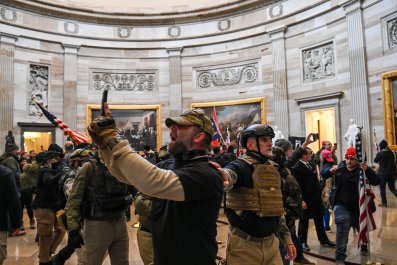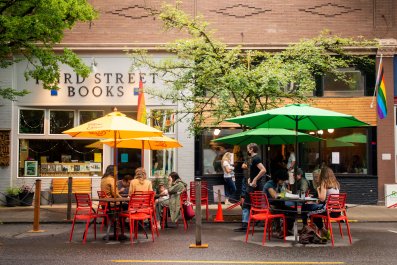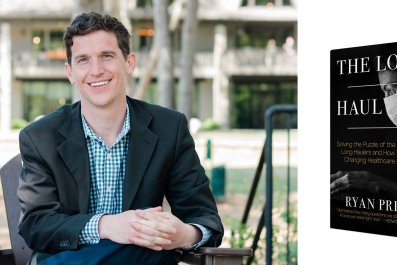This story is the third in Newsweek's "Covert China" series exploring how China is working to expand its influence in order to achieve global preeminence by 2049.
A Chinese man strikes at a banner saying "Chinese Communist Party Step Down!" in New York City. He is challenged briefly, then disappears in the crowd at a Columbia University protest against China's "Zero COVID" policy.
Another man pummels a female student after she shouts that Chinese authorities must be held accountable for the deaths of 10 people in a fire in an apartment complex under lockdown in Urumqi, sparking a rare wave of demonstrations in China. In Berkeley, California, a suspected Communist Party supporter sets ablaze a memorial placed by protesters mourning the dead in Urumqi.

In Flushing, Queens, home to a flourishing Chinese community, a lawyer who fled corruption in China holds a sign on a street calling for the end of the party. But the party is watching, his family in China are promptly harassed by the police, and he begs friends who posted the image on American social media to remove it.
As the totalitarian state tries to suppress the biggest protests to roil China since the 1989 Tiananmen Square democracy movement, Beijing's long arm is also trying to choke shows of sympathy in America and silence voices in the U.S. opposing the Communist Party and its leader, Xi Jinping, democracy activists and protesters say.
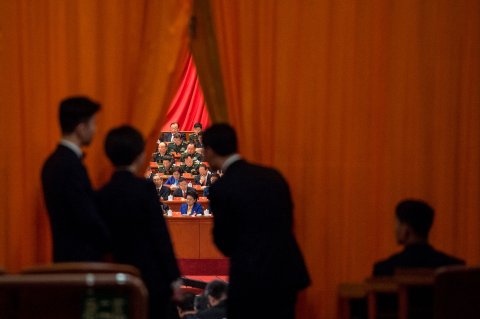
The pushback to the protests is one facet of an apparatus that Beijing has been building for years inside the United States to spread its influence and enforce its will in what has become an increasing source of fear for U.S. based opponents of the Chinese Communist Party— many U.S. citizens among them—who spoke to Newsweek of confirmed instances and constant anxiety over surveillance, intimidation, attempts to force repatriation and even physical attacks.
Recent cases brought by U.S. law enforcement authorities have highlighted the brazenness of some of the suspected clandestine efforts to intimidate critics of China or force Beijing's enemies to return home.
Newsweek's reporting points to a growing Chinese police and security presence in the United States and to a still bigger Communist Party operational network than has previously been reported by a European human rights group focused on Chinese overseas "police stations" and acknowledged by FBI Director Christopher Wray. The rights group, Safeguard Defenders, said an upcoming report would reveal more than 100 Chinese police stations globally, with some - unlike in the U.S. - assisted by host nations.
Newsweek has identified nine confirmed or suspected Chinese proxy police stations and courts in New York, San Francisco and Los Angeles. It also found a further nine "Chinese Support Centers" that are part of the United Front—the Communist Party's domestic and international influence apparatus – that offer unspecified support to overseas Chinese.
These structures are feeding into the intimidation in the United States just as Xi is facing the biggest challenge of his rule at home, protesters say.
Jiemin Bai, a U.S. citizen, New Yorker and veteran of the Chinese pro-democracy scene who was at the Columbia protest, said "pro-Communist troublemakers" mingled with the protesters. He said he was sure China's security services and police-connected networks in the U.S. knew of the protest.
"The CCP, they sent young spies," Bai told Newsweek. He challenged the unknown young man who attacked the banner but didn't know who he was.
An organizer of the Columbia protest, a sociology and economics undergraduate from China called Shawn, said in an interview she didn't know the man who viciously struck her fellow student and that he had said he was a protester. Shawn did not give her full name for fear of reprisals.
"It's a common strategy for the CCP to pretend to be a protester," Shawn said. "It's impossible to be sure there is no connection. I personally think there is a connection."
Specific evidence of actions by Chinese agents and links to the network within the United States is not always easy to come by for either Chinese dissidents or U.S. law enforcement, but there is no doubt over the fear that has been spread among Communist Party critics by incident after incident.
Unexplained Incidents
Driving in Washington D.C. one night in May this year, the storied dissident Wei Jingsheng was involved in what he believes was a deliberate car crash. In a pincer movement, a car in front braked sharply, forcing Wei to brake hard too. A car behind smashed into him fast.
"The car that hit my car backed up quickly and didn't hesitate to run away. The car in front of me waited for the car behind it to escape and quickly fled the scene as well," Wei said via email. Wei and his fellow dissidents in the car reported the incident to U.S. authorities, including the FBI.
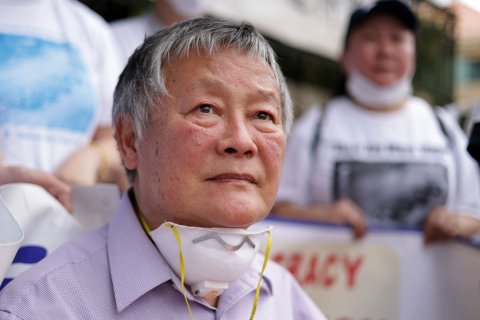
While it is unclear whether it was a deliberate crash, the FBI has documented an alleged Chinese agent suggesting a car crash to target a dissident, pastor and former U.S. military member Xiong Yan, who wanted to run for Congress on Long Island, in a recent case.
In December last year, Qiming Lin, believed by the agency to be a retired but still active agent of the Chinese Ministry of State Security, was recorded by the FBI as telling a private investigator in the U.S. whom he allegedly hired to carry out the plot that a "car accident, (he) will be completely wrecked (chuckles), right?"
Another case is that of Fengsuo Zhou, who has attended protests in the U.S. against the Chinese government for years. He says two people he believes were Chinese agents drove past his former home in San Francisco in 2017, photographing it with an ostentatiously big camera. "They could have used an iPhone. But they used something that they were sure I would see," he said in an interview.
Zhou says he and others have been physically attacked at Chinese democracy protests in cities including New York and Los Angeles. He complained the U.S. police response was not as robust as he believed it should be.
"Many of us, we are U.S. citizens, but the U.S. doesn't really protect us even though our physical safety is at stake," he said.
A Murder in Flushing
Among the most terrifying incidents for critics of the Communist Party was the murder of 66-year-old New York lawyer Jim Li at his office in Flushing on March 14, 2022. No evidence had been presented by U.S. authorities that China had a hand in the killing of the Tiananmen Square veteran, but there was every sign it pleased the party's backers.
"Another traitor of the motherland, dead in America" read a headline on China.com, a state-affiliated media platform.
Li's alleged killer, Xiaoning Zhang, was a slight young woman who had come from China on a student visa half a year earlier. She was arrested covered in blood and carrying two knives as Li lay dying, stabbed in the neck and chest. As she was led out of New York City's 109th police precinct she shouted "traitor!" at a waiting crowd of mostly Chinese-Americans.
"You are Chinese but you oppose the Communist Party!" she bellowed before police pushed her into a car and drove off.
Both Li and his father had worked in China's security system but Li had turned to helping people from China gain asylum and was assisting U.S. authorities in combating China's so-called "transnational repression," said friends who spoke to Newsweek on condition of anonymity.
"He was using his knowledge to help the U.S. government to oppose the CCP. And in Chinese tradition, they think, if you betray the organization you should pay," said one friend who said he feared reprisals if he gave his name. The FBI declined to comment.
The Chinese embassy in Washington D.C. and its consulate in New York City did not reply to requests for comment. Zhang has been indicted by a grand jury for murder. She next appears in court in Queens on December 9.
Official Investigations
"Li's case is very strange, and it's making people nervous," said Chen Weiming, a Hangzhou-born artist living in Chino Hills outside Los Angeles who was himself the target of a plot last year after he made a sculpture of Xi as a COVID-19 virus, according to the Department of Justice. The sculpture mysteriously burned down.
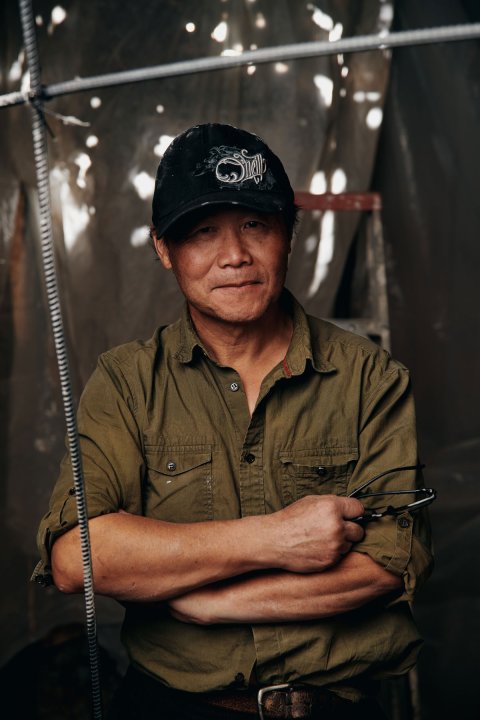
In March the DoJ announced it had arrested Fan "Frank" Liu and Matthew Ziburis in New York for conspiring to act as agents of the Chinese government to harass Chen. Liu and a third man, in China, were also charged with conspiring to bribe a federal official for information. In its complaint, the FBI said $3.1 million was transferred from Hong Kong to pay for the scheme.
In 2021, Ziburis visited Chen in his studio in California, expressing an interest in the virus sculpture the artist had made as a critical commentary on China's handling of COVID-19, Chen said. "He said he was working for a Jewish gallery owner who is very low-profile, but a fan of mine."
"The case with me is the first time I've directly experienced the CCP being so brutal. Normally an artist wouldn't get so much attention," he told Newsweek. "I mean, they came all the way to my studio! They also spent a lot of money on it."
After the attack on his work and the personal harassment—including drones and putting a GPS device on his car— "I don't feel especially safe anymore," Chen said.
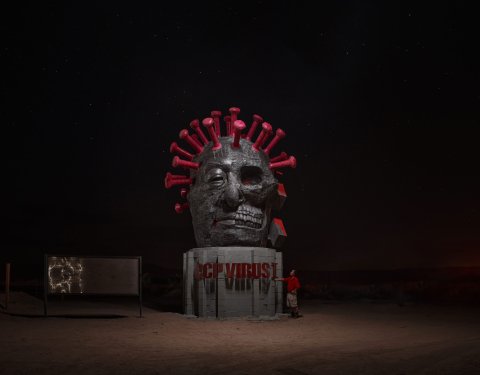
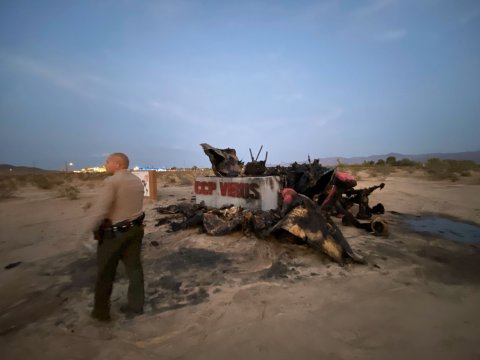
The DoJ announced more cases related to China in October against a total of 13 people. Seven were charged with trying to force the repatriation of a Chinese citizen living in the United States through threats and intimidation. This time, they were specifically connected to the Communist Party-linked Chinese networks in the United States.
Growing Threat
Overseas activities by Chinese security services have stepped up since 2013 under Xi's leadership. Operation "Sky Net" aims at Chinese around the world whom the state accuses of conducting telecom fraud—often conning Chinese citizens—and other crimes. "Fox Hunt" tries to get allegedly high-level corrupt officials who have fled abroad to return and face justice. The Chinese government says thousands have been "persuaded" to return.
The party forces targets back by threatening them directly, and indirectly via their families in China, who in turn pile pressure on loved ones abroad, said Huang Hua, a legal adviser in London who specializes in political asylum.
Last year, Huang tried to help a human rights lawyer, Zhang Shichao, who fled China seeking asylum in Britain. But after months of massive pressure from his family and police in Jinan in Shandong province Zhang went back—against Huang's advice.
"They promised him all kinds of good conditions," Huang said, but Zhang has since disappeared. Subsequently, Huang said he was harassed via phone and text by the same police who were looking for other people to persuade to return.
MI5 Director Ken McCallum, who heads the British domestic security and counterterrorism agency, warned in November that Chinese authorities had stepped up intimidation of overseas Chinese—not just those accused of crimes but anyone who publicly challenges the Communist Party. This was expected to increase as Xi consolidates power, McCallum said.
"The Chinese authorities use all the means at their disposal to monitor—and where they deem necessary intimidate—the Chinese diaspora," he said.
Chinese consulates abroad "know all about this activity," said Marco Cheng-hui Ho, a CCP analyst at the Kuma Academy in Taiwan, a civil defense organization.
The party was building a system of extra-territoriality, Ho said. "They see it as more efficient. They can get whom they want."
Hometown Associations and the United Front
In the U.S., leading members of the Chinese diaspora may work closely with the Communist Party through chambers of commerce or "hometown associations" connected to a shared place of origin in China. Some proudly serve as bases for police contact points, proxy courts adjudicating Chinese cases, and liaison points for Chinese local governments, Newsweek research shows.
That said, many of the five million or so people of Chinese origin in the U.S. are not part of any diaspora associations and do not necessarily support their actions. Not all hometown associations have ties to the United Front, either.
But the great importance of the United Front to the CCP was underlined in November when Xi Jinping's chief of staff, Ding Xuexiang, called for "Chinese sons and daughters at home and abroad" to join in a "united front" to help the party in "overcoming the enemy" and "ruling the country."
On the surface, the associations appear as no more than community groups offering business opportunities and celebrations at Lunar New Year.
Their links to China's United Front—the Ministry of State Security (MSS) and local Public Security Bureau (PSB) work through the Front—become more apparent from the Chinese end. Multiple Chinese official announcements and media reviewed by Newsweek show top office holders traveling to China from the United States and elsewhere to discuss operations and sometimes to receive rewards for the achievements of their foreign-based stations.
"The MSS, PSB and other Chinese intelligence entities are acting with impunity in our societies. They particularly, but not exclusively, target our Chinese populations for surveillance and harassment," said Anne-Marie Brady, a Global Fellow at the Wilson Center in Washington, D.C., and professor of Chinese politics at the University of Canterbury, New Zealand.
One person working in the U.S. government who follows diaspora issues closely said suspected functions included "a combination of intelligence gathering, influence operations, and maybe even muscle."
Among those suspected of working closely with the Communist Party is New York resident and hotel owner An Quanzhong, who was indicted by the Justice Department in October for allegedly plotting to coerce a Chinese citizen to return home. An is an honorary head and former president of the New York Shandong Hometown Association, according to its website. He is also a member of the United Front Chinese People's Political Consultative Conference in his hometown of Zaozhuang in Shandong, according to official Chinese government information.
The New York association was not connected to the case, Lu Chengrui, another former office holder told the U.S.-based community website Huarenbang.
'Police Stations'
A report in September by advocacy group Safeguard Defenders titled "Chinese Transnational Policing Gone Wild" brought shock around the world with its revelation that China has dozens of overseas "police stations"—including one in New York.
But Newsweek has confirmed more points serving the same or a similar purpose, such as courts—with a total of six in New York, two in Los Angeles and one in San Francisco. All were identified through extensive searches of Chinese police and court reports as well as state and diaspora media accounts and their own websites. None replied to requests for comment.
They say they offer services such as renewing documents—Chinese household registrations or driving licenses—and offering long-distance health checks with hospitals in China to match bureaucratic requirements. They may also locate "lost" persons to serve them with court papers, as the New York Wenzhou Chamber of Commerce and Industry does.
The State Department is aware of reports of alleged overseas "police stations" run by the People's Republic of China, a spokesperson told Newsweek. "We take this issue very seriously and continue to be concerned about PRC transnational repression. We are also coordinating with allies and partners on this issue," the person said.
Chinese Foreign Ministry Spokesperson Zhao Lijian said that according to the ministry's understanding they were not "police stations" or "police service centers."
"They assist overseas Chinese nationals who need help in accessing the online service platform to get their driving licenses renewed and receive physical check-ups for that purpose. The venues are provided by local overseas Chinese communities who would like to be helpful, and the people who work on those sites are all volunteers who come from these communities. They are not police personnel from China. There is no need to make people nervous about this," he said in a November 2 briefing in Beijing.
In addition to the police and court proxies, Newsweek identified nine "Chinese Support Centers" in the U.S., part of a worldwide network set up in 2014 by the Overseas Chinese Affairs Office in Beijing which today is part of the United Front system. They are in San Francisco, Los Angeles, Salt Lake City, Houston, St. Louis, Minnesota, Nebraska and the Carolinas.
They are part of a world-wide network. According to People's Daily, the CCP mouthpiece, they offer translation, legal advice and welfare. In some places "with bad law and order" such as "Africa and South America" they offer security, fire and ambulance teams.
"In China we often say, 'When in trouble call the police,' so outside of China, 'When in trouble call the Chinese Support Center'," People's Daily said.
Dissidents think the proxies may be still more widespread—and older.
Wei Jingsheng, who served at least two jail terms in China, said Chinese police "points" monitoring dissidents in the U.S. date from at least 1993—when he said he was told of one in New York by a member of the political security police in China.
"The chief of the division traveled regularly to New York to gather intelligence and launch missions," Wei said.
'Responsibility and Obligation To Protect'
Whatever China's government says about the overseas "police stations," police in China say it is their duty to operate internationally.
"Public security organs have the responsibility and obligation to protect the rights and interests of all the overseas folks from being infringed," Wang Xizhang, the chief of police and deputy mayor of Fuzhou in Fujian province said in January.
Some of the services on offer can be helpful and that is why people are prepared to deal with them, said Huang, the London asylum expert.
But whatever the case, a host country must usually give permission for law enforcement activity on foreign soil.
"Generally, PRC police who set up shop in another country without permission are indeed infringing that country's sovereignty and legal system," said Jerome Cohen, a veteran China law expert at Paul, Weiss in New York City and a law professor at New York University School of Law.
Some of the diaspora also make clear their willingness to support police operations in their countries. Li Hua, the president of the New York-based Fujian Chinese Federation of America said in January that associations such as his were at the service of the Chinese police.
"Use the power of overseas Chinese associations to expand every police and overseas Chinese service," Li told public security and other officials gathered in Fuzhou in China to discuss "Police and Overseas Chinese Services."
From the other side of the U.S., Chen Yongkun, a San Francisco resident, U.S. citizen and prominent member of the overseas Chinese community attended a PSB meeting in 2019 in Wenzhou, a major trading city in Zhejiang province near Shanghai. Chen has had many posts including California chairman of the America Zhejiang Wenzhou General Chamber of Commerce.
Chen told the security officials he was "extremely happy to feel the concern of the PSB for overseas Chinese," according to the Wangyi Wenzhou, a state-approved news website reported, as police distributed licenses for 11 police contact points on five continents.
Meanwhile, Liu Linchun, chairman of the Wenzhou Los Angeles Chamber of Commerce USA, led a delegation from the U.S. in 2019 to meet United Front and police officials in Li'ao in Zhejiang and to inspect their ""Chinese Hometown Court Relay Station."
Despite repeated attempts, Newsweek could not reach Li, Chen and Liu for comment.
Two associations in New York, the America Fuzhou Tingjiang General Association and the United Chinese Association of Eastern U.S.—which has an address in Mott Street—work with police in Mawei in Fujian. In March 2019 two office holders of the American associations met with Mawei officers for "in-depth exchanges" on "cooperation and services for overseas Chinese," according to East South Net, a state-approved Chinese media. The United Chinese association did not immediately reply to an email requesting comment.
The overseas police proxies all connect back to a headquarters in a Chinese province. Those command centers go by a variety of names such as "Police and Overseas Chinese Home". Even "Overseas 110"—China's 911 number.
One in Libao in coastal Jiangsu province near Shanghai says it has appointed "international student representatives" in the U.S. as "overseas liaison officers." Their job —to link up with the "police grid" at home. The operation began in May, according to Sina.com.
"Encourage more overseas Chinese to join the police overseas posts, constantly extend our work tentacles, broaden services," Libao police exhorted.
In Nantong, a city of more than seven million people also near Shanghai, the PSB shows off its high tech approach: its Network Security Detachment has an "Intelligent Police and Overseas Chinese Visualization Platform."
"Internationalize public security work, make global cooperation combat-ready, normalize joint operations," Nantong police said, noting their assistance for 132 Nantong citizens who escaped Ukraine after Russia's February 2022 invasion.
Many Chinese local police departments present their overseas contact points as part of the Belt and Road Initiative, Xi's signature effort to invest in overseas countries. Nantong police described theirs as part of a related concept of Xi's: "global security governance."
A Global Issue
China's proxy police stations and courts are not only in the United States. There are dozens in Europe alone, beginning in Italy around 2005 as many Chinese began working in the luxury goods industry in the north of the country including in Prato in Tuscany, according to reports on Chinese state media.
Safeguard Defenders said its upcoming report had identified 48 additional "police stations" since the previous 54 it had reported in September and that it would examine "the role joint policing initiatives between China and several European nations, including Italy, have played in piloting a wider expansion of Chinese overseas stations." At least 13 countries have started investigating the stations since its previous report, it said.
Newsweek can reveal there are five police proxies in Germany: in Berlin, Hamburg, Munich, Frankfurt and Duesseldorf. All connect back to one police precinct in China, Lishui in Zhejiang, according to a photograph in the Europe-based, Chinese-language China Business News—since deleted. Newsweek has a copy.
The photograph shows five men, all leaders of the proxies, seated in a row while the person in the middle holds a large, gold-colored plaque emblazoned with "Lishui Police and Overseas Chinese Relay Station.'' All also belong to a United Front organization that works to unify Taiwan with China.
In Europe, at least one proxy police station has been linked to threats against a Chinese exile. German and Dutch police are investigating threats against Wang Jingyu, who lives in Holland, by a Chinese citizen who says he is a "volunteer" at the proxy police station in Frankfurt, Germany's financial center, Wang told Newsweek. The "volunteer" books hotel rooms in Wang's name in Europe and in the U.S., then calls in bomb threats, said Wang.
"In October, the guy made bookings in my name worth thousands of euros" or dollars, "in D.C., New York and San Francisco," said Wang. "So the U.S. police warned the Dutch police," he said. Wang fled China after being targeted by police for supporting failed democracy protests in Hong Kong in 2019.
Germany's federal criminal police authorities, the Bundeskriminalamt, declined to comment.
Yet the proxy police stations are still only part of the overall Chinese influence operations in the United States and elsewhere. In 2020, Newsweek mapped groups linked to CCP influence operations in the United States and found about 600. Since then, the number has grown to at least 626.
It is not only association leaders from the United States who visit China to discuss operations. Chinese officials also come to the United States.
The government of Shenyang city in Liaoning province in China's wintry northeast set up an unofficial "work liaison station" in the non-profit Los Angeles Shenyang Chamber of Commerce in 2017 to facilitate "regular information exchange," the chamber said. It is registered with the United Front in China and has a "friendly chamber of commerce" agreement with it. The L.A. launch was attended by Chinese officials including the head of Shenyang's foreign affairs department.
Chinese Courts in the U.S.
There are proxy courts, too. Buried in a blizzard of statistics in a 2016 annual report by Lucheng People's Court in Zhejiang province is an intriguing detail: the court says it runs "overseas mediation points" in New York and Los Angeles to "effectively mediate cases involving overseas Chinese."
The court first appointed "liaison officers" in 2014, Wenzhou Net reported: Pan Zhiqin, the secretary-general of the Wenzhou Chamber of Commerce and Industry in New York and Lin Jiaji, its chairman. Two years later, the Lucheng court also set up a contact point in Los Angeles to manage cases in the U.S. Midwest, it said. It did not specify where in L.A. the liaison point was.
"It seems like yesterday that I first assisted in a cross-border court hearing," Pan reminisced in 2017, according to Wenzhou Net.
The court conducted a divorce case online serving papers to a Ms. Li in New York from her husband in China, Mr. Jia, who had lost touch. The case took just half an hour, Wenzhou Net reported. Jia got the kids.
That was a civil dispute. But a report in People's Daily in April 2022 said overseas liaison officers also conduct criminal cases via a "criminal resolution mechanism with Overseas Chinese characteristics."
In Qingtian in Zhejiang province prosecutors "proactively use overseas liaison people, middlemen and warm-hearted overseas Chinese leaders" to solve conflicts, People's Daily said.
The America Changle Association in New York City, named for a district in Fujian province from where millions have emigrated, drew attention this year when members published a photograph of themselves with a banner saying, "overseas police station," as shown in a report by the Madrid-based Safeguard Defenders.
Newsweek visited the premises in Royal East Plaza, a glass-fronted walkup on 107 East Broadway in Manhattan's Chinatown. Street level is a restaurant called Lanzhou Ramen. Upstairs is an accounting firm; above that, a herb and acupuncture clinic. The clearly identified association is on floor "3A"—actually the fourth floor, but the number four is inauspicious in China.
Two men inside denied it was any kind of police proxy.
"We just help some organizations in China dock here," said one, speaking fast, seeming nervous. "Mostly we help people to renew documents, things they couldn't do during COVID because no-one could go home," he said. Like his companion, he declined to give his name.
More formally dressed in a dark suit and white shirt, tieless and with rimless glasses, the other man hung back, occasionally shaking his head and hitting an elevator button as if to make the elevator come faster. Eventually there was a "ping" and both men disappeared inside with apparent relief.
But the proxy police station set up in the America Changle Association earlier that year was a second step: in 2020 it had set up a "Changle and Overseas Chinese Dispute Mediation Center" in the U.S. for Changle court in China, according to its chairman Lu Jianshun, speaking at its 24th anniversary party in September, in a report by Chinese language media New York News.
The association says in its charter that members must obey U.S. law.
It says they must obey Chinese law too.
Said Maya Wang of Human Rights Watch, "The more ties you have to China the more you are remotely controlled by strings, like marionettes, with rewards and punishments."
"The 'police stations' are one of a multitude of strings that foreign governments are not seeing or acting upon, and this is what makes people afraid," Wang said.
Cheryl Yu, a senior researcher at the Common Sense Society, contributed to this report.

Key References
United States Department of Justice: UNITED STATES OF AMERICA against QIMING LIN 03/16/22
Safeguard Defenders: 110 OVERSEAS Chinese Transnational Policing Gone Wild
United States Department of Justice: Five Individuals Charged Variously with Stalking, Harassing and Spying on U.S. Residents on Behalf of the PRC Secret Police
Melinda Katz District Attorney Queens County: QUEENS GRAND JURY INDICTS WOMAN FOR MURDER FOR STABBING DEATH OF IMMIGRATION LAWYER IN FLUSHING
Ministry of Foreign Affairs of the People's Republic of China: Foreign Ministry Spokesperson Zhao Lijian's Regular Press Conference on November 2, 2022
Liberty Sculpture Park CCP Virus
Update 12/03/22, 4:24 a.m ET: This article was updated to include a further attack by a suspected CCP supporter at Berkeley, California
Update 12/04/22, 3:01 p.m ET: This article was updated to include information on a new upcoming report from Safeguard Defenders


